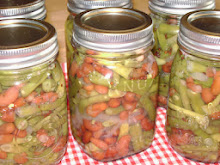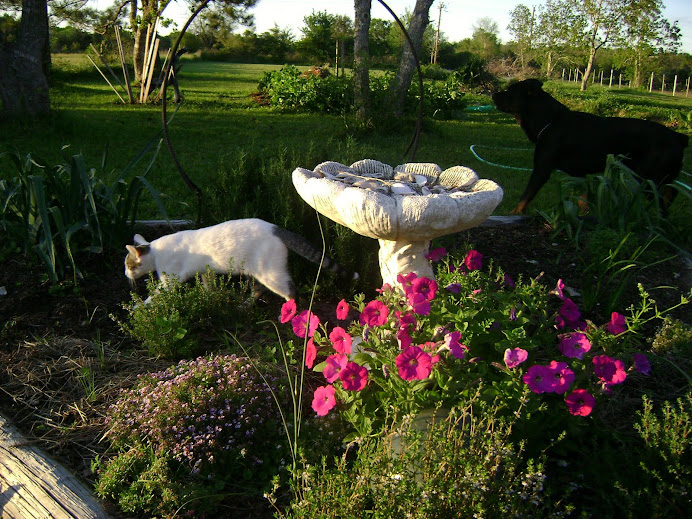 Pooh indeed has lost his organic honey jar. I've tried to help him find it, but alas it is not to be found. Poor Pooh and poor me, for we both love our honey so......
Pooh indeed has lost his organic honey jar. I've tried to help him find it, but alas it is not to be found. Poor Pooh and poor me, for we both love our honey so......The plain fact is, honeybees travel several miles from their hive foraging for attractive flowers to sip their sweet nectar. They then return to their hives and get to work on making that golden sweet honey that only the honeybees do so perfectly. Even though the beekeepers flowers may be grown organically, you cannot possibly guarantee that your neighbors are not spreading pesticides on their lawn and garden. So unfortunately for Pooh and me, if the jars say organic or certified organic it is not true. There really is no such thing. The USDA's standards for organic honey are quite silly to say the least.
Over the weekend I attended a beekeeping seminar at our local nursery Martha's Bloomers. Our local beekeeper from Lone Star Farms in Bryan Texas gave us all a very informative class and welcomed the many eager questions from the 30 or so participants. He has been raising bees since 1964 and you could see with his experience he truly has a love for the honeybee and for honey. I'm so amazed that there are so many wonderful people in our country very concerned over the colony collapse disorder. CCD is what they are calling the illness affecting the worlds populations of honeybees, putting them at risk of rapid decline. The decline of honeybees will gravely affect our food supply since we depend on the honeybee to pollinate the majority of our food crops. There are several factors that attribute to CCD. The heavy use of pesticides weaken the bees health. Some commercial beekeepers put a lot of stress on their bees but stripping all the honey from the hives and not leaving enough food for the bees. Some instead supplement the bees food with sugar water. Also several years back the African Bee moved its way throughout the southern states of the US and they carried a mite and beetle with them that infected our bees. Once the decline began it left the US without enough bees to take care of our commercial crops. We in turn imported honeybees from Australia to help with the job. I can't say for sure, but from all the articles I have read, Australia has their own set of problems with heavy usage of pesticides and bee health problems. So who really knows what had happened there. At any rate they banned the import of honeybees to this country. The whole matter is really such a huge mess that many scientists from all over the world are trying frantically to resolve the mysterious problem that seems to have such a variety of distresses.
The thing that many of us do not realize is that there are many simple things that each one of us can do to help the plight of the honeybee. And not just the honeybee alone, but all the thousands of species of wild bees and pollinators for which we all depend on for the survival of our planet. Let's take a look at the bigger picture for just a minute. 95 percent of beekeepers in the United States put chemicals in their beehives. Yep, chemicals in the beehive itself. Why you might ask? Well it began when the Honey bees from Africa were imported to Brazil in the 1950s. The purpose was to introduce genetic material from the tropically adapted African bees into the resident European bees, thereby creating a bee better suited for a tropical environment. In 1957, several African queen bees were released accidentally. According to Dennis Brown from Lone Star Farms, the African bees carried with them mites and beetles. As they've worked their way through most all the southern states in America they in turn infected our honeybees. So as usual it seems, we reacted by using chemicals to resolve the issue instead of using nature to fix the problem. What the scant 5 percent of beekeepers have done is to breed out the weaker bees and keep the strongest. Now, after a period of time the bees on their own are strong enough to clean the mites off of their own bodies and keep the hives clean. There is absolutely no reason to be placing chemicals in the hives. Some of Lone Star Farms results to prove this statement, is that commercial beekeepers have to replace the queen bee in the hive every year. The chemical free queens are surviving for up to 4 years before having to be replaced. This shows the stamina of a healthy bee not being affected by chemicals that ultimately weaken the commercial bees. I think it's fantastic personally. It's all quite bad enough the poor honeybees have to drink nectar from pesticide soaked crops and flowers, but to have to live with the chemical inside the hive as well is clearly not necessary. I would suspect that all these chemicals and pesticides are not very healthy for Pooh and me either.

This is a 2008 map of the invasion of the African Bee
Happy Gardening!!Some simple ideas you could begin with to help our pollinators survival might be to stop using pesticides on your lawn and garden. Try growing more native plants and flowers year round to give our friends plenty of food and nutrients. Concentrate on creating a Bee Lovers Garden or a Pollinator Garden. Some scientist are looking for people to help them with their research by taking photographs of bees and sending them in for identification. Think about changing the grass you are growing for your lawn to a native variety that might include a little clover. Perhaps you may be inclined to become a chemical free beekeeper yourself. Help spread the word that chemicals and pesticides are bad for people and our ecosystems. We must all work together for the hope of a happy future.
As for Pooh and me, the best honey jar we can find is the one that says Chemical Free on the Label. These beekeepers are quite proud of what they are doing, and surely should bee!!
If you would like to learn more about chemical free bees and beekeeping I invite you to check out Lone Star Farms and see what Dennis Brown is doing.
http://www.lonestarfarms.net/index.php

As for Pooh and me, the best honey jar we can find is the one that says Chemical Free on the Label. These beekeepers are quite proud of what they are doing, and surely should bee!!
If you would like to learn more about chemical free bees and beekeeping I invite you to check out Lone Star Farms and see what Dennis Brown is doing.
http://www.lonestarfarms.net/index.php

Pammy








































Timely, and a very nice post Pammy! We're setting up a new website for the Illinois Queen Initiative- a group of Illinois beekeepers (and entomologists) that are breeding native local bees instead of importing them from other regions. The theory is that native bees, just like native plants have better stress and disease resistance. We had been importing queens from out west, but your wonderful western bees don't seem to like our harsh winters. Not that I blame them :)
ReplyDeleteOh please keep me updated on the new website. I would love to follow along with what is going on!! It all sounds so very promising indeed!! I can see the logic in it B) xxooxx
ReplyDeleteReally interesting post Pammie. Our honey bees in the UK have been in decline for a number of years too but there has been a resurgance of people wanting to keep their own bees which is helping, and this is such a tiny island so every hive counts. Unfortunately I don't have the room on my tiny patch but keeping bees would be a blessing one day.
ReplyDeleteHave you read 'The Secret Life of Bees' by Sue Monk Kidd - a novel but stunningly written! Highly recommended.
Thank you for the lovely comments you left on my blog.
Take care
Lesley x
Hi Leslie, I haven't read the novel, but will have to seek it out. It's so wonderful that there are caring people all over the world involved in such a sad affair. All all of us can simply plant a flower to help indeed. I enjoy reading your blog very much. Enjoy your trip. xxooxx
ReplyDeleteThank you for posting such a useful, impressive and a wicked article./Wow.. looking good!
ReplyDeleteOrganic Gardens
Thanks for visiting Thiruppathy. I'm glad you enjoyed the post. ;)
ReplyDelete